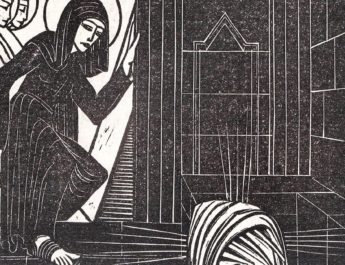1 Peter 2:2-10
Fifth Sunday of Easter A
2 Like newbornA infants,B longC for the pure,D spiritualE milk, so that by it you may growF into salvationG—
A “newborn” = artigennetos. 1x in NT. From arti (now, at this moment); {from airo (raise, take up, lift, remove)} + gennao (to beget, give birth to, bring forth; properly, procreation by the father, but used of the mother by extension; figuratively, can mean to regenerate); {from genna (descent, birth); from genos (family, offspring, kin – in a literal or figurative sense); from ginomai (to come into being, to happen, become, be born; to emerge from one state or condition to another; this is coming into being with the sense of movement or growth)}. This is literally newly born. Can also be used figuratively for a new convert.
B “infants” = brephos. 8x in NT. This is used of a fetus (as when the child leapt in Elizabeth’s womb on seeing Mary in Luke 1:41) or a newborn (as the child found in the manger in Luke 2:12). It is a young child or an infant in a literal or figurative sense.
C “long” = epipotheo. 9x in NT. From epi (on, upon, at, what is fitting) + potheo (to yearn). This is to long for, greatly desire, or strain towards. It can also imply doting or a desire to possess something or someone, whether legitimately or wrongfully.
D “pure” = adolos. 1x in NT. From a (not, without) + dolos (literally bait, but used figuratively for treachery, stealth, guile, or deceit); {from dello (probably to decoy)}. This is not caught in a trap, without trickery or guile, no deceitful. Figuratively, guileless, genuine, unadulterated, or pure.
E “spiritual” = logikos. 2x in NT. From logos (word, statement, speech, analogy; a word that carries an idea or expresses a thought, a saying; a person with a message or reasoning laid out in words; by implication, a topic, line of reasoning, or a motive; can be used for a divine utterance or as Word – Christ); from lego (to speak, tell, mention). This is reasonable or rational. It can refer to a word or mean thoughtful. Figuratively, this is logical or spiritual as contrasted with literal. Logic, here, seen as divine reason.
F “grow” = auxano. Perhaps from auksano (to grow or enlarge, whether literal or figurative). This is growing whether in size or mature or greatness or some other metric.
G “salvation” = soteria. From soter (a savior, deliverer); from sozo. (to save, heal, preserve, or rescue; taking someone from danger to safety; delivering or protecting literally or figuratively); from sos (safe, rescued, well). This is deliverance, salvation, preservation, welfare, prosperity, safety.
3 if indeed you have tastedH that the LordI is good.J
H “tasted” = geuomai. 15x in NT. This is to taste, which implies eating. It can be used figuratively to mean experience, whether positively or negatively.
I “Lord” = kurios. From kuros (authority, supremacy). This is a respectful address meaning master or sir. It refers to one who has control or power greater than one’s own. So, it was also applied to God and Jesus as Master or Lord.
J “good” = chrestos. 7x in NT. From chraomai (to use, make use of, give what is needed, act in a specific way, request). This is useful, good, well-fitted, benevolent, kind, gracious. It was also a name given to slaves in the ancient world.
4 ComeK to him, a living stone, thoughL rejectedM by mortalsN
K “come” = proserchomai. From pros (for, at, towards) + erchomai (to come, go). This is to approach, draw near, come up to. It is also used figuratively to mean worship.
L {untranslated} = men. This is truly, indeed, even, in fact. Often, it is not translated, but used to emphasize affirmation.
M “rejected” = apodokimazo. 9x in NT. From apo (from, away from) + dokimazo (to test, examine, prove; to approve after subjecting to a test to determine if it is real or acceptable; to test in a literal or figurative sense); {from dokimos (what passes the test, approved, acceptable, genuine, verified); from dechomai (to warmly receive, be ready for what is offered, take, accept, or welcome; to receive in a literal or figurative sense) or dokeo (to have an opinion, seem, appear, suppose; a personal judgment; to think); {from dokos (opinion)}}. This is rejected or disqualified following a test. It is rejected after rigorous investigation and so seen as useless or unworthy.
N “mortals” = anthropos. Probably from aner (man, male, husband) + ops (eye, face). This is human, humankind. Used for all genders.
yet chosenO and preciousP in God’sQ sight, and
O “chosen” = eklektos. Related to “spiritual” in v2. From eklego (to choose, select, elect); {from ek (from, from out of) + lego (to speak, tell, mention)}. This is to select or choose. It is making a person choice – a favorite.
P “precious” = entimos. 5x in NT. From en (in, on, at, by, with) + time (worth or something’s perceived value; literally, price, but figuratively, the honor or value one sees in someone or something else; also esteem or dignity; also precious or valuables); {from tino (to pay, be punished, pay a penalty or fine because of a crime); from tio (to pay respect, value)}. This is held in honor so valued, precious, distinguished, or dear.
Q “God’s” = theos. From Proto-Indo-European origins, meaning do, put, place. This is God or a god in general.
5 like living stones, let yourselves be builtR into a spiritualS house,T to be a holyU priesthood,
R “built” = oikodomeo. From oikos (house – the building, the household, the family, descendants; the temple) + domeo (to build). This is to build a house or be a house builder. Figuratively, it can mean to edify or encourage, be strong or embolden.
S “spiritual” = pneumatikos. From pneuma (wind, breath, or ghost; a breeze or blast of air, a breath; figuratively, a spirit, the human soul or the part of us that is rational; also angels, demons, God, and the Holy Spirit); from pneo (to blow, breath, breathe hard). This is spiritual, spiritual people, or spiritual things – that which is ethereal or divine or religious
T “house” = oikos. Related to “built” in v5. See note R above.
U “holy” = hagios. From hagnos (holy, sacred, pure ethically, ritually, or ceremonially; prepared for worship, chaste, unadulterated, pure to the core; undefiled by sin; figurative for innocent, modest, perfect). God is totally different from humanity and thus set apart. That which is consecrated to worship God (elements of worship) or to serve God (as the saints) are holy because they are now set apart for God’s purposes. Holy because important to God. This is sacred physically, pure. It can be morally blameless or ceremonially consecrated.
to offerV spiritual sacrificesW acceptableX to God through JesusY Christ.Z
V “offer” = anaphero. 10x in NT. From ana (up, back, among, again, anew) + phero (to bear, bring, lead, make known publicly; to carry in a literal or figurative sense). This is to carry or lead up as to a goal or particular destination. It can also be used for offering a sacrifice.
W “sacrifices” = thusia. From thuo (to breathe violently, seethe, rage; properly, to rush as breathing heavy; so smoke as in offering an animal sacrifice by fire; by extension, killing or slaying in general). This is a sacrifice or offering. It can refer to the act of sacrifice or the thing being sacrificed. Also, this is sacrifice in a literal or figurative sense.
X “acceptable” = euprosdektos. Perhaps related to “rejected” in v4. 5x in NT. From eu (good, well, well done, rightly) + prosdechomai (to welcome, await, accept; to receive personally; to expect with confidence or patience); {from pros (at, to, toward, with) + dechomai (see note M above)}. This is welcome, pleasing, approved, or favorable.
Y “Jesus” = iesous. From Hebrew Yehoshua (Joshua, the Lord is salvation); {from YHVH (proper name of the God of Israel; the self-existent and eternal one); {from havah (to become) or from hayah (to come to pass, become, be)} + yasha (to deliver, defend, help, preserve, rescue; properly, to be open, wide or free, which implies being safe. So, in a causative sense, this is to free someone). This is Jesus or Joshua in Greek – the Lord saves or the Lord is salvation.
Z “Christ” = christos. From chrio (consecrate by anointing with oil; often done for prophets, priests, or kings). Literally, the anointed one, Christ. The Greek word for Messiah.
6 For it standsAA in scripture:BB
“See,CC I am laying in ZionDD a stone,
a cornerstoneEE chosen and precious;
and whoever believesFF in him will not be put to shame.”GG
AA “stands” = periecho. 2x in NT. From peri (all-around, encompassing, excess) + echo (to have, hold, possess). This is to surround, encompass, contain, or seize.
BB “scripture” = graphe. From grapho (to write). This is literally writing, a document. In the New Testament, this is always used for scripture.
CC “see” = idou. From eido (to be aware, see, know, remember, appreciate). This is see! Lo! Behold! Look! Used to express surprise and or draw attention to the statement.
DD “Zion” = sion. 7x in NT. From Hebrew tsiyyon (Zion – a mountain in Jerusalem as well as another name for Jerusalem itself or the people); related to tsyiyyun (signpost, monument); from tsavah (to charge someone, to command, order); from the same as tsiyyah (dryness drought); from a root meaning parched as desert, dry land. This is Zion – the mountain in Jerusalem, the city, or its people. Also used figuratively to refer to the church.
EE “cornerstone” = akrogoniaios. 2x in NT. From akron (end, tip, uttermost); {from ake (point, edge)} + gonia (angle, corner; figuratively, a secret place); {from gonu (knee, foot)}. This is corner or cornerstone.
FF “believes” = pisteuo. From pistis (faith, faithfulness, belief, trust, confidence; to be persuaded or come to trust); from peitho (to have confidence, urge, be persuaded, agree, assure, believe, have confidence, trust). This is to believe, entrust, have faith it, affirm, have confidence in. This is less to do with a series of beliefs or doctrines that one believes and more to do with faithfulness, loyalty, and fidelity. It is trusting and then acting based on that trust.
GG “put to shame” = kataischuno. 13x in NT. From kata (down, against, according to, among) + aischunomai (to dishonor, put to shame, shrink, disfigure) [from aischos (shame, disgrace, disfigurement)]. This is literally to shame down, which is to say disgrace or implying make someone blush. It can be frustrate, dishonor, confound or shame.
7 To you then who believe, he is precious;HH but for those who do not believe,II
“The stone that the buildersJJ rejected
has become the very headKK of the corner,”LL
HH “precious” = time. Related to “precious” in v4. See note P above.
II “not believe” = apisteo. Related to “believes” in v6. 8x in NT. From apistos (unbelieving, unbelievers, incredulous; can be someone who has never believed or someone who believed and then rejected faith); {from a (not, without) + pistos (faithful, trustworthy, reliable, sure, or true – a fullness of faith); {from peitho (see note FF above)}}. This is to be faithless, prove false, or be unpersuaded. It denotes refusing to be faithful – greater than simple disbelief.
JJ “builders” = oikodomeo. Same as “built” in v5. See note R above.
KK “head” = kephale. This is head or chief. It can be a literal head or, figuratively, a ruler or lord. It can also refer to a corner stone. This is where the word “cephalic” comes from.
LL “corner” = gonia. Related to “cornerstone” in v6. 9x in NT. See note EE above.
8 and
“A stone that makes them stumble,MM
and a rockNN that makes them fall.”OO
They stumblePP because they disobeyQQ the word,RR as they were destined to do.
MM “stumble” = proskomma. 6x in NT. From proskopto (to kick against, stumble, strike, beat on, surge against like water does, or take offense; to trip up in a literal or figurative sense); {from pros (at, towards, for) + kopto (to cut, strike, cut off; beating the chest to lament and so to mourn)}. This is stumbling, obstacle, or something that causes one to stumble. It can also figuratively be a moral embarrassment or something that leads one to fall from faithfulness.
NN “rock” = petra. 15x in NT. This is large rock that is connected and or projecting like a rock, ledge, or cliff. It can also be cave or stony ground.
OO “fall” = skandalon. 15x in NT. Perhaps from kampto (to bend or bow). This is a stumbling block, offense, hindrance, or scandal. Properly, this is the part of the trap that triggers it shut on the victim. So, as a snare, it is anything that causes error or offense, something that makes one stumble or traps someone. This is where the word “scandal” comes from.
PP “stumble” = proskopto. Related to “stumble” in v8. 8x in NT. See note MM above.
QQ “disobey” = apeitheo. Related to “believes” in v6 & “not believe” in v7. 14x in NT. From apeithes (unbelieving, disobedient, spiritually rebellious, unpersuadable); {from a (not, without) + peitho (see note FF above)}. This is to disobey or rebel – willful disbelief.
RR “word” = logos. Related to “spiritual” in v2 & “chosen” in v4. From lego (see note E above). This is word, statement, speech, analogy. It is a word that carries an idea or expresses a thought, a saying. It could refer to a person with a message or reasoning laid out in words. By implication, this could be a topic, line of reasoning, or a motive. It can be used for a divine utterance or as Word – Christ.
9 But you are a chosen race,SS a royal priesthood, a holy nation,TT God’s ownUU people,VV
SS “race” = genos. Related to “newborn” in v2 & “become” in v7. From ginomai (see note A above). This is family, offspring, kin – in a literal or figurative sense.
TT “nation” = ethnos. Probably from etho (a custom or culture). This is people who are united by having similar customs or culture. Generally, it is used to refer to Gentiles. This is a tribe, race, nation, or Gentiles in general. This is where the term “ethnicity” comes from.
UU “own” = peripoiesis. 5x in NT. From peripoieo (to preserve, acquire, earn, make all around); {from peri (about, concerning, all around, encompassing) + poieo (to make, do, construct, cause)}. This is acquisition, ownership, or preservation. It is the act of acquiring or possession itself.
VV “people” = laos. This is the people or crowd – often used for the chosen people. This is where the word “laity” comes from.
in order that you may proclaimWW the mighty actsXX of him who calledYY you out of darknessZZ into his marvelousAAA light.BBB
10 Once you were not a people,
but now you are God’s people;
once you had not received mercy,CCC
but now you have received mercy.
WW “proclaim” = exaggello. 2x in NT. From ek (from, from out of) + aggello (to announce, report) {from aggelos (angel, messenger – supernatural or human envoy of God); probably from ago (lead, bring, drive, carry, guide, go)}. This is to proclaim fully and publicly, to publish or celebrate.
XX “mighty acts” = arete. Perhaps related to “newborn” in v2. 5x in NT. Perhaps from the same as arrhen (male or man); from arsen (male or man) or from airo (see note A above). Properly, this is manliness. It is used to refer to virtue, valor, excellence, uprightness, gracious acts, or praise. It could be intrinsic or ascribed.
YY “called” = kaleo. Related to keleuo (to command, order, direct); from kelomai (to urge on). This is to call by name, invite, to name, bid, summon, call aloud.
ZZ “darkness” = skotos. Perhaps from the base of skia (shadow, thick darkness, outline; figurative for a spiritual situation that is good or bad). This is darkness literal or figurative – as moral or spiritual darkness, sin and what comes from it. This can also mean obscurity.
AAA “marvelous” = thaumazo. From thauma (a wonder or marvel; used abstractly for wonderment or amazement; something that evokes emotional astonishment); may be from theaomai (to behold, look upon, see, contemplate, visit); from thaomai (to gaze at a spectacle; to look at or contemplate as a spectator; to interpret something in efforts to grasp its significance). This is to marvel, wonder, or admire. To be amazed out of one’s senses or be awestruck. Being astonished and starting to contemplate what was beheld. This root is where the word “theatre” comes from.
BBB “light” = phos. From phao (to shine or make visible, especially with rays of light); from the same as phaino (to bring light, cause to appear, shine, become visible or clear). This is light, a source of light, fire, or radiance. This is light with specific reference to what it reveals. It is luminousness whether natural or artificial, abstract or concrete, literal or figurative.
CCC “received mercy” = eleeo. From eleos (mercy, pity, tender mercy, or compassion; generally understood in action by word or deed). This is to have pity on, show mercy to, be compassionate; often used for God’s grace. When we sing or say “kyrie eleison” (Lord, have mercy), it is from this root verb.
Image Credit: “Milk” by Sander van der Wel from the Netherlands.




